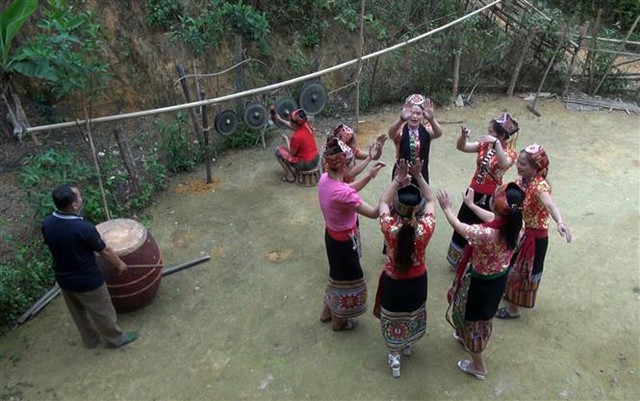The Thai ethnic community in Nghe An Province has made great efforts to preserve and promote their gong culture which is at the risk of extinction under the influence of modern.

Villager Van Van Hoan is owner of a 50-year-old gong set.
In their mind, gongs are treasures, family heirlooms and symbols of sacred power. Gongs are present and closely associated with the Tuong Duong District's Thai people at important events such as the national Tet (Lunar New Year) holiday, naming ceremony, new rice celebration, rain praying ritual, wedding ceremony and new house celebration.
They believe that the sound of gongs is a language that expresses the state and emotions of the human soul and heart. More importantly, it is also a bond that builds community and village cohesion.
The understanding of their unique treasure pushes them to take part in process of preserving, conserving and promoting the gong culture through practical and effective works.
Na Kho Village, in the middle of Pu Huong Forest in Nga My Commune, has nearly 80 households, more than 370 people of Thai ethnic minority.
Currently in the nearly-80-year-old village, there are 3 families that still own and preserve three sets of ancient gongs.

Villager Van Van Hoan teaches people of Na Kho Village to play gongs.
Village elder Van Van Hoan is one of them.
Hoan said each set included four gongs in different sizes and each had different sound and resonance.
When his family moved to Na Kho in 1946, they had a set of gongs. However, in 1972, due to the war, the village was devastated by American planes bombing and the gongs were broken.
His father was a thay mo (shaman) who often mastered ceremonies of religious and spiritual rituals in the village so his family bought a new set of gongs in 1973.
Considering gongs as items with material and spiritual value, associated with the ups and downs of the family and clan, Hoan always keeps them carefully.
In the traditional stilt house, he puts the gong set in a solemn position in the middle of the house. He preserves and cleans the gongs like new to maintain their sound clear and resonant.
"I have to clean them carefully after using them in every important occasion before hanging them up for storage. It will help my gongs in perfect conditions," Hoan said.
Lu Van Uon, head of Na Kho village, said that according to the Thai people, the names of the four gongs are mac me (the largest and heaviest one), and then mac cang, mac pa and mac la. The size and weight of the gongs created different sound when tapped.
A set of gongs that has a good sound, vibration and clarity must be cast from pure bronze. To own perfect gongs, people must go to localities that are famous for gong casting techniques. The buyer must have good musical ability, "understand" the sound of gongs and be proficient in playing this instrument.

The Thai people of Na Kho Village dance in the beautiful sounds of gongs
Uon said Na Kho villagers considered gongs as their valuable asset, the pride of the clan. Families owning gongs always kept them well over the years.
In particular, the old people opened classes to popularise their cultural and spiritual values and gong playing. Currently many young people know how to perform with gongs.
Villager Chuong Thi Tuyet shared that previously most people of the younger generation in the village did not know how to play gongs. Thanks to the dedication of the elderly, they could play their ethnic gongs. She was very happy and proud about that.
According to statistics, Tuong Duong District is home to nearly 100 sets of gongs, of which, nearly 40 sets are ancient gongs of more than 50 years old. These precious instruments are preserved and kept by village elders, village chiefs, and reputable people.
Villages that have good gongs include Na Ngan, Na Kho, Pot in Nga My Commune; Chan, Phong in Thach Giam Commune; and Canh Khin and Coc in Yen Hoa Commune.
In these villages, there are from three to four sets of rare gongs which are preserved and passed down from generation to generation.
In recent years, local party committees and authorities have joined hands in helping people preserve, conserve and promote their cultural values.
Vi Thi Mui, vice chairwoman of Nga My Commune People's Committee, said that the special and unique gong culture was a feature that dated back to ancient times. It identified the typical culture of the Thai people who considered gongs as indispensable part in their spiritual and daily life.
Local authorities have always paid attention and encouraged villagers to well preserve their gongs. They are suggested to be kept solemnly at the communal house or in the families of a reputable people.
During the holidays and festivals, gongs will be played. In the vibrant sound of gongs, people dance, sing, and mua sap (dance between bamboo poles) together, making the atmosphere more joyful and exciting, while connecting people and increasing solidarity./.
Thanh Ha